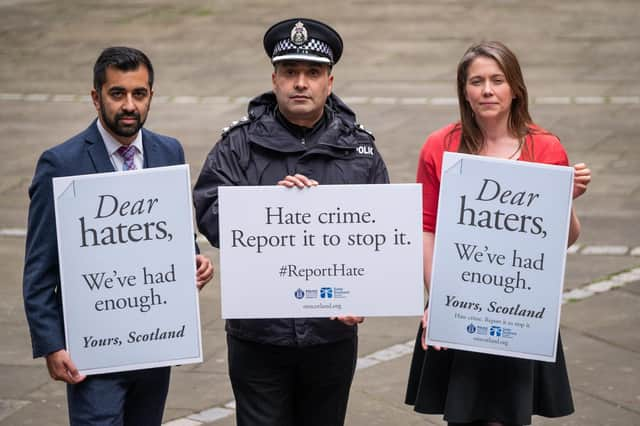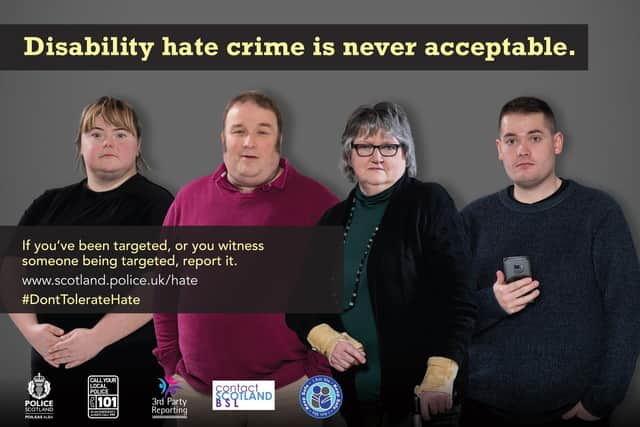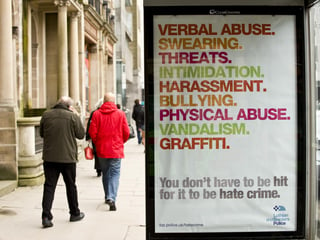Scotland's Hate Crime Bill: Why Muslims' and Jews' shared experiences of racism must be heard – Professor Joe Goldblatt


Papa was, in the 1970s, the first Jewish candidate from his neighbourhood for the Dallas, Texas City Council and he was a victim of anti-semitic threats.
In previous months, the far-right American Nazi Party had worn stormtrooper uniforms and marched for several hours outside his hardware store. Papa reported this to the FBI, who interviewed my father and told him they had received other threats against him including a potential bombing.
Advertisement
Hide AdAdvertisement
Hide AdPapa agreed to allow them to place a small wire upon the bonnet of his automobile so that if it was ever broken he would know to not start his vehicle and immediately notify the FBI. All of this seemed very foreign and strange to me as I had grown up in a world that was relatively free of anti-semitic incidents.
Horrific anti-semitic hate mail
However, the recent debate on potential hate crime legislation in Scotland has placed that experience of 53 years ago, and a more recent one, in greater perspective. A few years ago, I received an anonymous seven-page anti-semitic letter through the external post at my Scottish university.
The letter contained the most horrific attacks upon the Jewish people and myself personally. I reported this to the university’s security department who responded: “We have never had this happen before. What would you like us to do?”


I said that, although I found this uncomfortable and embarrassing, I felt I must report it to Police Scotland as a hate crime so it would be officially recorded for statistical purposes. University security followed my request and then I waited for Police Scotland to contact me for what seemed to me to be a long time.
Three months later, a detective constable contacted me by telephone to arrange a meeting. I had asked that he notify me before he arrived so I could arrange a private meeting room in order to not draw public attention to this issue.
Instead, the constable arrived without an appointment and I was called by security to meet him in the visitor’s waiting area. I quickly found a private meeting room and the detective apologised for the delay, saying several officers had been sick.
Police could do little
He apologised again as he explained it was standard operating procedure to finger print the complainant of a hate crime to rule them out as the perpetrator. He said some complainants send themselves letters to create publicity for hate crime organisations.
I begrudgingly agreed to be finger printed, for the first time in my life, and explained what had happened. The detective said that because the letter was anonymous there was little he could do. However, he would come back to me later with an update. I never heard from him or Police Scotland again.
Advertisement
Hide AdAdvertisement
Hide AdIn addition to the hate letter, I received a flood of anti-semitic videos and these were later blocked by my university IT department. I also reported these to Police Scotland and was told internet hate crimes are actually easier to trace the perpetrator than a letter received by post.
For two years, I kept this incident quiet so as not to worry my wife or family and to not call attention to the perpetrators’ mission to terrify me and others. However, my mind changed when I attended an event at the Scottish Parliament to hear testimony from members of the Islamic community about their own experiences with hate crime. One Muslim described walking while wearing her hijab and being verbally and physically attacked in a small town in the Scottish Highlands while on holiday.
Breaking my silence
I was so deeply shocked and saddened on hearing this that I, for the first time in my life, in front of 50 other citizens and elected officials, shared my own story of anti-semitism in Scotland. When I finished, you could hear a pin drop.
Afterwards, several other Muslim women approached me to thank me for sharing my story. These negative, shared experiences brought us closer together as Scottish Jews and Muslims. I immediately thought that there needs to be more of this sharing of experiences to bring us closer together.
For example, the Edinburgh University Student Association (EUSA), to their credit, has recently issued a statement supporting the wearing of hijabs on campus. However, their stance on anti-semitism has been more erratic over many years.
Fortunately the UK Education Secretary has called upon universities throughout the UK to adopt the International Holocaust Remembrance Alliance definition of anti-semitism before Christmas of this year and our own Scottish Parliament is now discussing revised hate-crime legislation.
Good people must act
Whilst no piece of legislation is perfect, the Hate Crime bill has my personal support because I believe it will be helpful to those communities who are most vulnerable in Scottish society.
Recently, having seen the Scottish Government official guidance on proper etiquette during the pandemic, I was motivated to draft, on behalf of the Edinburgh Interfaith Association, new guidance on kindness and compassion practices for faith communities to better influence and lead their members to promote greater understanding, tolerance and love within our civil society during this unprecedented time.
Advertisement
Hide AdAdvertisement
Hide AdThe anti-racism movement has further motivated me to stand up and speak out to remind myself and others that the only thing that allows this evil to grow is when good people refuse to do something positive.
Dr Martin Luther King’s wise admonition some 60 years ago is even more relevant today: “In the end, we will remember not the words of our enemies, but the silence of our friends.” Therefore, I shall never be silent again and I hope that many of my fellow citizens during this festive season and far beyond shall also stand up and speak out.
Professor Joe Goldblatt is emeritus professor of planned events at Queen Margaret University and treasurer of the Edinburgh Interfaith Association. To learn more about his personal views visit www.joegoldblatt.scot
